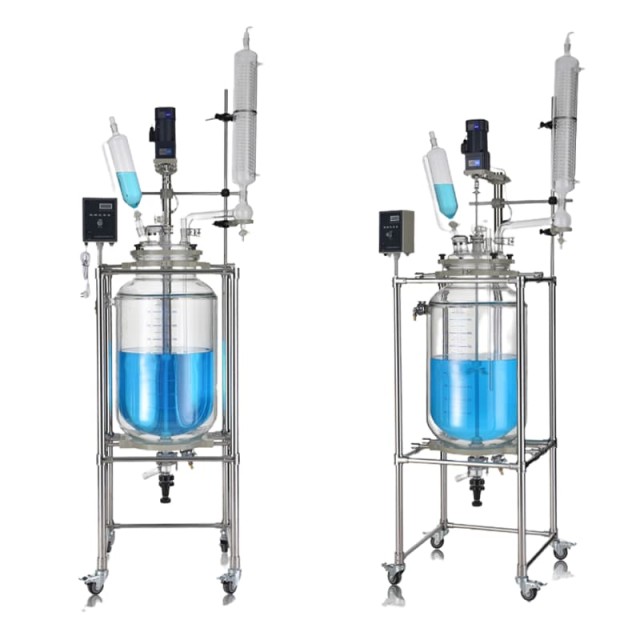
Glass Reactor
80-150L Jacketed Glass Reactor Vessel for Lab Applications
Item Number : KR-80
Price varies based on specs and customizations
- Reactor Volume
- 80-150 L
- Jacket Volume
- 24-45 L
- Max. Torgue
- 378-425 N/cm
- Stirring Speed
- 0-650 rpm
- Working temperature
- -80~250 ℃
- Vacuum
- 0.098 Mpa

Shipping:
Contact us to get shipping details Enjoy On-time Dispatch Guarantee.
Applications
Glass reactor system combines the glassware vessel, speed controlled stirring, controlled temperature heating or chilling, as while as filtering, lifting, or tilting mechanical functions, which creates an idea environment for the different target materials synthetic reaction, distillation, separation and filtration in the pharmaceutical, chemical, biological products and other industries.
KinTek glass reactors vessel volumes are from 1 liters to 200 liters,glassware can be single, double and triple jacketed, stirring system can be fixed speed or various speed adjustable, agitating shaft and impeller can be different materials or assembling, reactor assemble can be lift-able and tilt-able for convenient materials handling, standard input and output ports for heating or chilling circulating, also supply various optional functions like filtering assembling, anti-explosive controls, warm keep jacket, heating jacket and so on. Kindle tech also offer reactor custom tailor service, client just text us the working purpose and requests, we will work out detail plan proposals to our clients.
Detail & Parts





Features
- Hand-made food grade borosilicate glassware, high transparent, smooth fluid surface
- Wide range glassware temperature working adaptability , varies from -43°C up to 200°C
- Accurate stirring speed control and strong agitating power,guarantee the material even mixing
- Heavy duty and compact support framework design, durable working and space saving
- Solvent-resistant vales and sealing rings, make material reaction result more stable
- PTFE valve material prevent reacting with samples, keep the purity of sample material
- Multiple safety protections for dry running,over temperature and ground power failures
- Optional anti-explosive system, filtering system, warm keep jacket, heating jacket to meet particular working purpose
Technical specifications

| Model | KGR-80 | KGR-100 | KGR-150 |
| Reactor Volume | 80L | 100L | 150L |
| Jacket Volume | 24L | 30L | 45L |
| Stirring Power | 370W | 370W | 400W |
| Max. Torgue | 378N/cm | 378N/cm | 425N/cm |
| Port Sealing | PTFE | ||
| Speed Control | Knop Stepless Speed Regulation | ||
| Stirring Speed | 0-650rpm | ||
| Working temperature | -80~250℃ | ||
| Vacuum | 0.098Mpa | ||
| Safty Protection | Over-current/ ground fault/over-temperature protection | ||
| Working Environment | 5-35℃ | ||
| Power Supply | 110-440V, 50/60Hz | ||
| Overall Dimensions | 700*630*2500 mm | 720*630*2700 mm | 750*660*2750 mm |
| Net weight | 140kg | 160kg | 200kg |
Warnings
Operator safety is the top important issue! Please operate the equipment with cautions. Working with inflammable& explosive or toxic gases is very dangerous, operators must take all necessary precautions before starting the equipment. Working with positive pressure inside the reactors or chambers is dangerous, operator must fellow the safety procedures strictly. Extra caution must also be taken when operating with air-reactive materials, especially under vacuum. A leak can draw air into the apparatus and cause a violent reaction to occur.
Designed for You
KinTek provide deep custom made service and equipment to worldwide customers, our specialized teamwork and rich experienced engineers are capable to undertake the custom tailoring hardware and software equipment requirements, and help our customer to build up the exclusive and personalized equipment and solution!
Would you please drop your ideas to us, our engineers are ready for you now!
FAQ
What Is A Glass Reactor?
What Are The Advantages Of Glass Reactor?
What Material Is Glass Reactor?
What Are The Different Types Of Glass Reactors?
What Temperature Should A Glass Reactor Be?
4.9
out of
5
The glass reactor is very easy to use, and the performance is excellent. The glass material is of high quality and does not react with the solutions.
4.8
out of
5
The jacketed glass reactor is durable and has a long service life. The open-frame design provides maximum user accessibility, and the aluminum-coated components ensure optimum strength.
4.7
out of
5
The jacketed glass reactor is highly customizable and can be designed according to specific requirements. The different sizes and capacities meet the needs of various processes.
4.9
out of
5
The glass reactor is built for batch and semi-batch operation mode, with perfectly matched components and quality materials. It is suitable for various applications in different industries.
4.8
out of
5
The single jacketed glass reactor is a basic type of jacket batch vessel, widely used in pharmaceutical and chemical processing industries. It allows for uniform heat or cold interchange between liquids.
4.7
out of
5
The single jacketed glass reactor includes a reaction lid with multifunctional docks, enabling operators to carry out various processes without affecting agitation speed or temperature.
4.9
out of
5
The jacketed glass reactor system combines glassware vessel, stirring, temperature control, filtering, lifting, and tilting functions, creating an ideal environment for different target materials.
4.8
out of
5
KinTek glass reactor vessel volumes range from 1 liter to 200 liters, with various stirring systems, agitating shafts, and impellers to meet specific requirements.
4.7
out of
5
The glass reactor is made of hand-made food-grade borosilicate glassware, ensuring high transparency and a smooth fluid surface.
4.9
out of
5
The glass reactor has accurate stirring speed control and strong agitating power, ensuring even mixing of materials.
REQUEST A QUOTE
Our professional team will reply to you within one business day. Please feel free to contact us!
Related Products
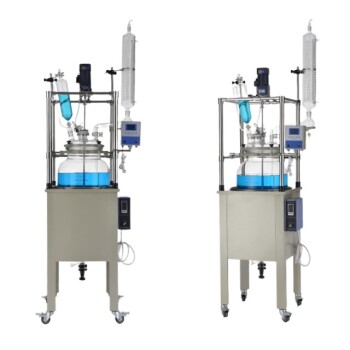
80-150L Single Jacketed Glass Reactor Vessel for Lab Use
Looking for a glass reactor system for your lab? Our 80-150L single glass reactor offers controlled temperature, speed, and mechanical functions for synthetic reactions, distillation, and more. With customizable options and tailored services, KinTek has you covered.

Lifting Tilting Jacketed Glass Reactor Vessel for Lab Use
Enhance your synthetic reactions, distillation, and filtration processes with our lifting/tilting glass reactor system. With a wide range of temperature adaptability, accurate stirring control, and solvent-resistant valves, our system guarantees stable and pure results. Explore the features and optional functions today!
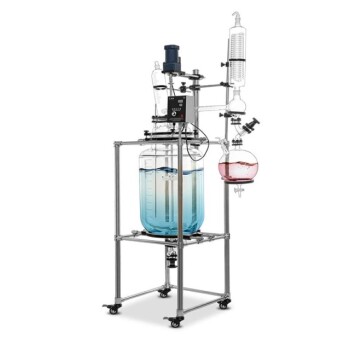
10-50L Jacketed Glass Reactor Vessel for Lab Applications
Discover the Versatile 10-50L Jacket Glass Reactor for Pharmaceutical, Chemical, and Biological Industries. Accurate Stirring Speed Control, Multiple Safety Protections, and Customizable Options Available. KinTek, Your Glass Reactor Partner.

1-5L Jacketed Glass Reactor Vessel Lab Glass Reactor
Discover the perfect solution for your pharmaceutical, chemical, or biological products with our 1-5L jacket glass reactor system. Custom options available.

1-5L Single Jacketed Glass Reactor Vessel for Lab Use
Find your ideal glass reactor system for synthetic reactions, distillation, and filtration. Choose from 1-200L volumes, adjustable stirring and temperature control, and custom options. KinTek has you covered!
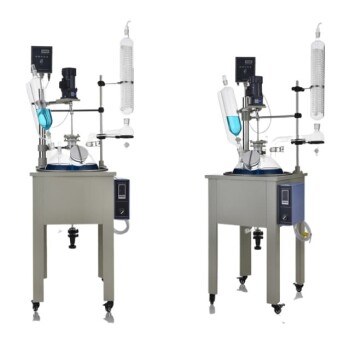
10-50L Single Jacketed Glass Reactor Vessel for Lab Applications
Looking for a reliable single glass reactor system for your lab? Our 10-50L reactor offers precise temperature and stirring control, durable support, and safety features for synthetic reactions, distillation, and more. KinTek's customizable options and tailored services are here to meet your needs.

Molecular Distillation Equipment Short Path Molecular Distillation
Purify and concentrate natural products with ease using our molecular distillation process. With high vacuum pressure, low operating temperatures, and short heating times, preserve the natural quality of your materials while achieving excellent separation. Discover the advantages today!

Laboratory Vacuum Tilt Rotary Tube Furnace Rotating Tube Furnace
Discover the versatility of Laboratory Rotary Furnace: Ideal for calcination, drying, sintering, and high-temperature reactions. Adjustable rotating and tilting functions for optimal heating. Suitable for vacuum and controlled atmosphere environments. Learn more now!
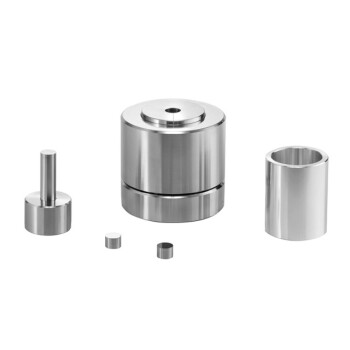
Assemble Lab Cylindrical Press Mold
Get reliable and precise molding with Assemble Lab Cylindrical Press Mold. Perfect for ultra-fine powder or delicate samples, widely used in material research and development.
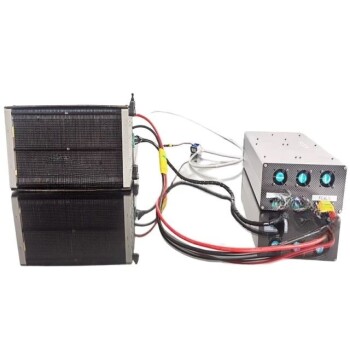
Hydrogen Fuel Cell Stack Battery Lab Equipment
A fuel cell stack is a modular, highly efficient way to generate electricity using hydrogen and oxygen through an electrochemical process. It can be used in various stationary and mobile applications as a clean and renewable energy source.
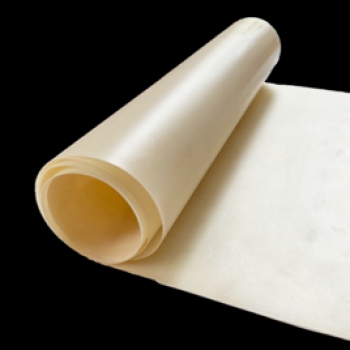
Anion Exchange Membrane for Laboratory Use
Anion exchange membranes (AEMs) are semipermeable membranes, usually made of ionomers, designed to conduct anions but reject gases such as oxygen or hydrogen.
Related Articles

Enhancing Safety in Your Laboratory: A Comprehensive Guide to Pressure Reactor Safety
Laboratory safety isn't just about you. Improper preparation and mishandling can cause potential hazards that could be disastrous if left unchecked. It is crucial to take the time to carefully prepare your pressure reactor and lab safety equipment, as even minor problems can escalate quickly when working under pressure.

High-End Rotary Evaporator (Rotavapor) Options Is It Worth the Cost
Rotary evaporators, also known as rotavaps, are laboratory equipment used for distillation and solvent recovery. They work by rotating a sample flask while simultaneously subjecting it to a vacuum, which reduces the boiling point of the solvent and causes it to evaporate.

Is a High-Priced Rotavapor Worth the Investment
Rotary evaporators, also known as rotavaps, are essential laboratory equipment used in the chemical, pharmaceutical, and biotech industries for the separation of solvents from a solution.

Safety Equipment In A Lab - Eye Protection
Safety glasses or chemical goggles must be donned before entering any wet bench lab, including cell culture labs. This applies to lab visitors, GT maintenance and custodial workers as well as staff and students.

Exploring the Fundamentals of Good Laboratory Practice: Ensuring Quality, Integrity, and Safety in Scientific Research

How to Save Money When Buying a Rotary Evaporator (Rotavapor)
A rotary evaporator, also known as a rotavapor, is a laboratory equipment commonly used to remove solvents from a sample. It works by rotating the sample flask to create a thin film of the solvent, which is then evaporated.

Mastering the Art of Rotary Evaporation
Rotary evaporation is a technique used in laboratories to remove solvents from samples through the process of evaporation.

Welcome Our Canada Customers Visit Kindle Tech Group
Welcome our Canada customers visit Kindle Tech Group, customer satisfied with the workshop which strictly control the quality, technical team introduced all the procedure of the production.

From Chemistry to Cooking The Versatility of Rotary Vacuum Evaporator
A rotary vacuum evaporator is a laboratory equipment that uses a rotating flask to remove solvents from a sample. It works by creating a vacuum in the system, which lowers the boiling point of the solvent and allows it to evaporate at lower temperatures.

Rotary Furnaces: A Comprehensive Guide to Advanced Materials Processing
Rotary furnaces are widely used for advanced materials processing due to their versatility, temperature uniformity, and energy efficiency. This guide provides an overview of rotary furnace technology, including its working principle, applications, design improvements, and control systems.

Laboratory Jacketed Vessels
Overview of jacketed vessels, their types, and applications in various industries.

Basic Laboratory Reaction Equipment
Overview of essential lab equipment for chemical reactions under various conditions.